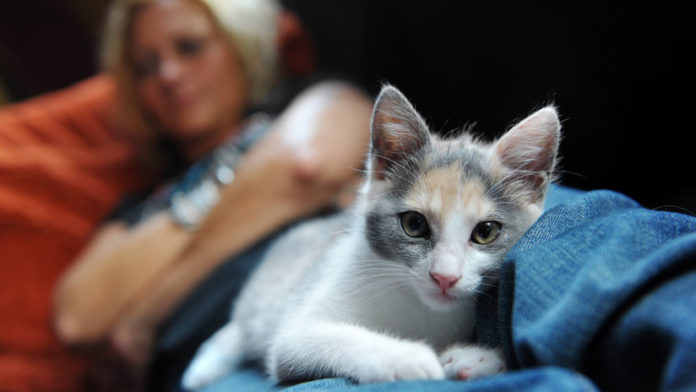
Cats make beloved pets for the millions of Americans who own one, but behind their furry faces lurks a little-known health hazard: Toxoplasma gondii (T. gondii), a cat-carried parasite that commonly spreads to humans. Up to one-third of the global population is thought to be infected with T. gondii, including more than 60 million people in the U.S. Though most people will never develop symptoms of a T. gondii infection, those with weakened immune symptoms could develop an illness called toxoplasmosis, which is associated with health effects including flu-like symptoms, miscarriages, birth defects, blindness and, in extreme cases, death. Recently published research now suggests that there could be a link between the ubiquitous parasite and mental illness.
The idea that T. gondii can influence our minds is old news. For years, scientists have known that the parasite, which takes up residence in our brains, can alter both personality and behavior. It has even been suggested that infection with T. gondii may play a role in cultural differences between nations. Overall, though, the side effects of infection for healthy, non-pregnant people were generally thought to be minor and relatively harmless. Recently, however, evidence has been mounting that suggests the psychological consequences of infection are much more severe than we once thought, even in otherwise asymptomatic people.
Two recently-published studies add to this line of evidence, finding significant associations between cat ownership, T. gondii infection, and risk of mental illness, especially schizophrenia.
In the first study, published in the journal Schizophrenia Research, lead investigators Dr. E. Fuller Torrey of the Stanley Medical Research Institute and Dr. Robert H. Yolken of the Stanley Laboratory of Developmental Neurovirology at the Johns Hopkins University School of Medicine, looked at an unused 1982 questionnaire that had been distributed by the National Institute of Mental Illness to 2,125 families, and found that 50 percent of people who developed schizophrenia owned a cat in childhood, compared to around 42 percent of those without the disorder. The difference was statistically significant, the researchers said, and it lines up with figures obtained from two smaller studies conducted among NAMI members in the 1990s.
“Cat ownership in childhood has now been reported in three studies to be significantly more common in families in which the child is later diagnosed with schizophrenia or another serious mental illness,” the authors said.
Another recent study, published in the journal Acta Psychiatrica Scandinavica, analyzed the findings of 50 published studies looking at the prevalence of T. gondii infection in people diagnosed with psychiatric disorders compared with healthy controls. For schizophrenia, evidence of an association with T. gondii was “overwhelming,” the researchers said. Specifically, people infected with the parasite were almost twice as likely to develop schizophrenia than those who weren’t infected. The meta-analysis also found associations between T. gondii infection and bipolar disorder, obsessive-compulsive disorder and addiction, but the relationships were not as clear.
Of course, this research only establishes a correlation, not a causal relationship. But evidence suggests that T. gondii could play a role in the development of mental illness through both direct and indirect mechanisms.
A common relative of malaria, T. gondii makes it way into the brain and forms microscopic cysts, which are thought to disrupt the production of neurotransmitters like dopamine and serotonin, setting the stage for mental illness. Other research points to our immune system as an indirect culprit. When we are infected with a pathogen like T. gondii, our immune system goes on the offensive, producing a group of molecules called cytokines that activate various immune cell types. This response appears to be particularly strong for T. gondii — according to one study, the parasite “provokes one of the most potent innate, pro-inflammatory responses of all infectious disease agents.” High levels of cytokines have been linked to serious psychiatric conditions including schizophrenia, bipolar disorder, depression and violent suicide attempts. The exact mechanism by which cytokines trigger schizophrenia and other mental illnesses is not well understood, but it is thought that the inflammatory response may induce changes in the brain’s neurotransmitter systems.
Further study is needed to determine how strong the link between cat ownership and schizophrenia actually is, but it’s important to note that the overall prevalence of the disorder is low. Some 1.1 percent of the population has been diagnosed with schizophrenia, while 30-37 percent of American households have a cat, according to the ASPCA. The Centers for Disease Control and Prevention recommends keeping cats indoors since T. gondii can be transmitted through neighboring cats, and keeping litter boxes covered to reduce the risk of accidental transmission through contact with cat feces.
